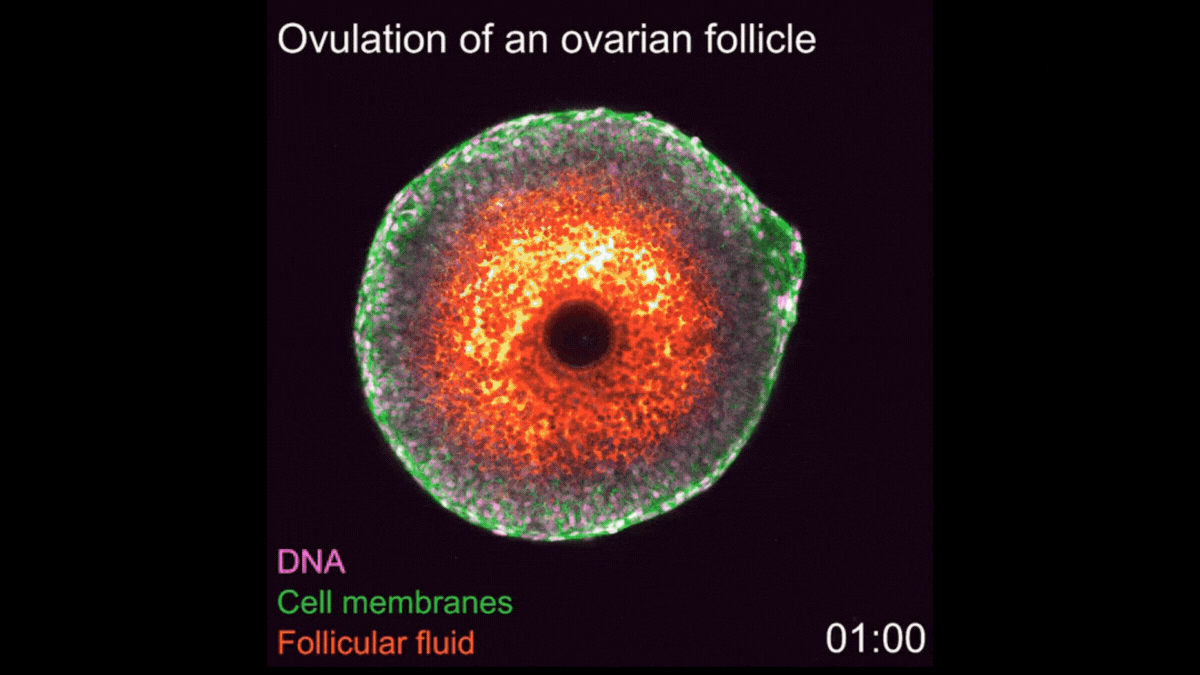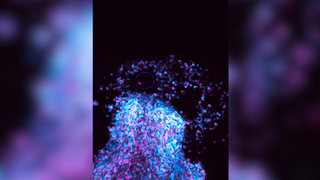Watch 1st-ever video of ovulation occurring in real-time
A new imaging technique enabled scientists to film every step of ovulation as it unfolds in mouse cells.

For the first time, scientists have filmed the process by which eggs are released from ovaries during ovulation — and they've captured it in exquisite detail.
In the impressive new video, a mature mouse egg cell is explosively expelled from its fluid-filled sac — known as a follicle — into a lab dish. The team observed follicles that had been isolated from mice and then grown in petri dishes before being encouraged to ovulate with the help of specific hormones.
Researchers captured this moment using a new imaging technique that can be used in living tissues, which they described in a study published Oct. 16 in the journal Nature Cell Biology.
Ovulation unfolds similarly in humans as it does in mice. Women of reproductive age typically release one mature egg from their ovaries into the fallopian tubes at around day 14 of their 28-day menstrual cycle. Then, following ovulation, the egg travels through the fallopian tubes to the uterus. If the egg is then fertilized by a sperm cell, it can potentially form an embryo; if not, menstruation soon begins and expels the egg from the body.
Related: One-third of trans people taking testosterone may still ovulate, raising chance of pregnancy
Historically, scientists have struggled to study the mechanisms that control ovulation in living organisms because the process occurs deep inside the body, the authors of the new paper noted. Consequently, most of what we currently know about ovulation has come from looking at tissues that have been extracted from the ovaries and then fixed in a solution so they can be viewed under a microscope outside the body. At that point, the preserved tissues are not alive.
In the new study, the researchers used the new imaging technique to watch the entire process of ovulation unfold in living mice follicles in lab dishes.
Sign up for the Live Science daily newsletter now
Get the world’s most fascinating discoveries delivered straight to your inbox.
They showed that ovulation occurs in three distinct phases. First, the largest and most mature follicle in the ovary expands in size — growing about 1.5-fold — over the course of eight hours. This process is driven by the secretion of a substance called hyaluronic acid, which indirectly causes fluid to flow into the follicle. Then, muscle cells in the outermost layer of the follicle rapidly contract, before finally squeezing out the egg within.
In separate experiments in the same study, the researchers found that blocking any of these three steps from happening impeded ovulation, meaning the egg wasn't released. This demonstrates how vital each of the steps are.
"Our findings show that ovulation is a remarkably robust process," study co-author Melina Schuh, director of the Max Planck Institute for Multidisciplinary Sciences in Germany, said in a statement. "Although an external stimulus is essential to trigger ovulation, the subsequent processes operate independently of the rest of the ovary, as all the necessary information is contained within the follicle itself," she said.
Schuh and colleagues now hope their imaging technique will be used to further enhance our understanding of ovulation and female fertility.
"With our new method, we and other researchers can further investigate the mechanisms of ovulation and hopefully gain new insights for human fertility research," she said.
Ever wonder why some people build muscle more easily than others or why freckles come out in the sun? Send us your questions about how the human body works to community@livescience.com with the subject line "Health Desk Q," and you may see your question answered on the website!

Emily is a health news writer based in London, United Kingdom. She holds a bachelor's degree in biology from Durham University and a master's degree in clinical and therapeutic neuroscience from Oxford University. She has worked in science communication, medical writing and as a local news reporter while undertaking journalism training. In 2018, she was named one of MHP Communications' 30 journalists to watch under 30. (emily.cooke@futurenet.com)
Most Popular




